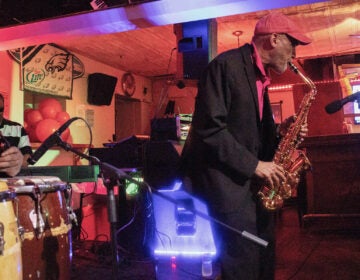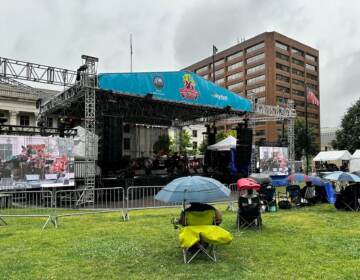Jazz legend Herbie Hancock becomes first musician to receive Ben Franklin Medal
"I'm not a musician": Jazz legend Herbie Hancock opens up about music, science, and his relationship with Benjamin Franklin.
-
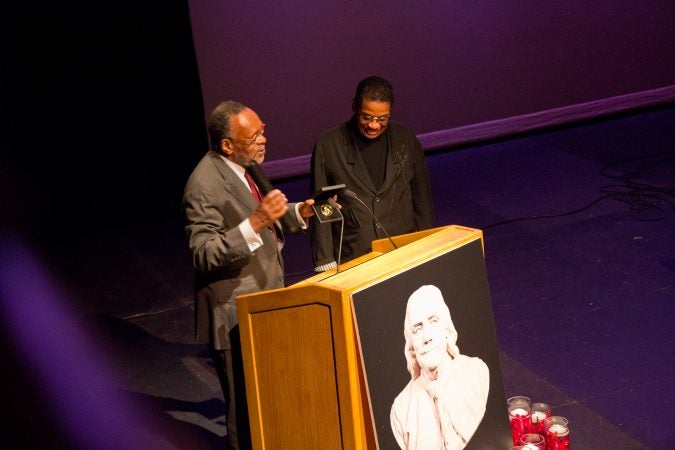
Oliver St. Clair Franklin, Honorary British Consul of the RSA, presents Herbie Hancock with the Benjamin Franklin Medal. (Kimberly Paynter/WHYY)
-
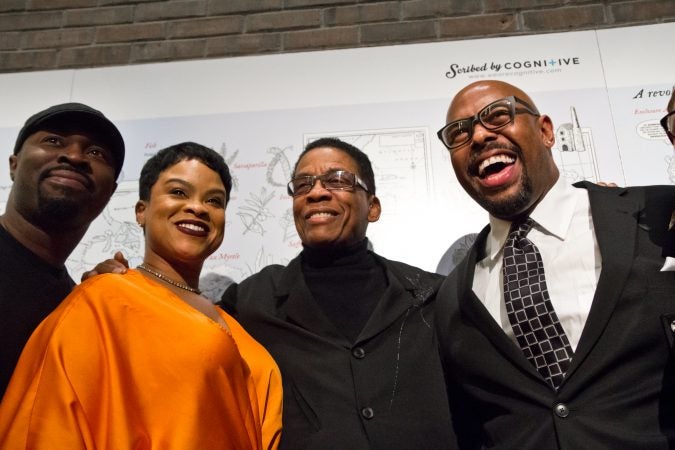
Herbie Hancock (center) with vocalist Laurin Talese (left) and bassist Christian McBride (right) at the Benjamin Franklin Medal award ceremony. (Kimberly Paynter/WHYY)
-
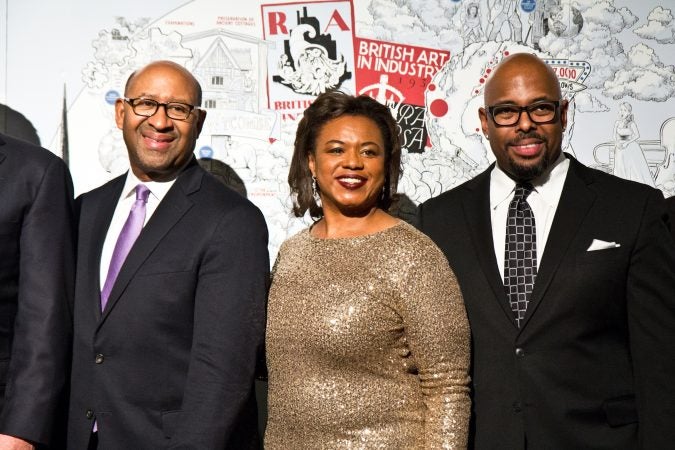
Lolita Jackson, RSA U.S. chairman, (center), former Mayor of Philadelphia Michael Nutter (left), and bassist Christian McBride at the Benjamin Franklin Medal award ceremony. (Kimberly Paynter/WHYY)
-
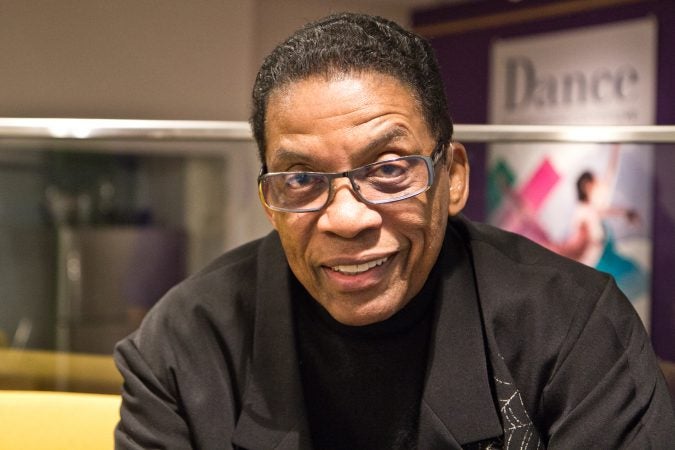
Herbie Hancock at the Benjamin Franklin Medal award ceremony. (Kimberly Paynter/WHYY)
Jazz legend Herbie Hancock was in Philadelphia Wednesday night to accept an award from the Royal Society for the Encouragement of Arts, Manufactures, and Commerce.
The 264-year-old Royal Society for the Arts, based in London, initiated the Benjamin Franklin Medal in 1956 to honor the Colonial fellow admitted in 1756. For the award, the RSA seeks people who transcend their vocations to generally benefit mankind.
Past recipients include naturalist Sir David Attenborough, architects Robert Venturi and Denise Scott Brown, and actress Dame Judi Dench. Hancock is the first musician to get the medal.
“He’s an American icon — at this point, we can escalate that to world icon,” said Christian McBride, himself a towering jazz artist, who performed for Hancock at the ceremony in the Annenberg Center of the University of Pennsylvania. “His art knows no bounds. That’s easier said than done. A lot of musicians say they appreciate everything, but don’t actually do everything. Herbie Hancock has done everything. He’s fearless.”
Since 2013, the Ben Franklin Medal has been administered by the American arm of the Royal Society: RSA US. The ceremony is usually staged in cities where there are clusters of RSA fellows; for the last three years, it has been in New York City. This was the first time the medal was given in Philadelphia.
“[Ben Franklin] founded the University of Pennsylvania, and Philadelphia is a city he loved,” said Lolita Jackson, chair of RSA US and a University of Pennsylvania alumnus. She now works for the Mayor of New York. “It made a lot of sense to bring the medal here, where it belongs.”
For his part, Hancock had never before heard of the medal when he was approached to receive it. He was game, nevertheless, because of its namesake.
“He’s been a hero of mine for years. I love the fact that he loved science,” said Hancock, about Franklin. “He was, like, the go-to person: If you wanted some wise answers, you go to Ben Franklin. I was an engineering student in school for 2 years, so I can identify with him from that standpoint.”
Hancock, 78, owns a 3-D phone (“most people don’t know what that is”) and calls himself the most “tech” person in the room. His career backs that up: His song “Rockit” (1983) was one of the first hits to use turntablism – i.e. scratching.
Although Ben Franklin dabbled in music, it was not seen as one of his talents. Nevertheless his interest in music and invention led him to develop the glass harmonica instrument.
“He was a curious person. I’ve always been curious, even before I knew I had an interest in music,” said Hancock. “My first recollection of an interest in anything was an interest in science, not music. I used to take apart watches and clocks to figure out how they worked. I got a beating when I tried to take my Lionel electric train apart.”
In his speech at the ceremony, Hancock recalled that he eventually turned to the piano as a child because he could not keep up with his older brother in sports.
That interest has led to a long and prolific career as a pianist and bandleader, producing a seemingly relentless series of landmark ensembles and recordings of post-bop, jazz funk, hip-hop, classical, and fusion music.
Now, he prefers not to identify himself as a musician.
“I’m not a musician. I’m a human being like anybody else,” he said. “It took me years to realize that. I always thought I was a musician; it’s all I’ve concentrated on and identified with for almost all my life.
“I started practicing Buddhism 45 years ago, and you sometimes have epiphanies,” he continued. “That was an important one. I’m only a musician when I’m writing or playing music, but I don’t do that 24 hours a day. I’m a father, a husband, a son, a friend, a citizen. I have many different functions.”
Fortunately, his jazz chops have supported his personal relationships and his spiritual life.
“Jazz is built on those humanistic characteristics. It’s about sharing and being non-judgmental, and supporting each other,” said Hancock. “Those are attributes of being a human being. That’s what we should all be striving for.”
Hancock’s life as a humanitarian has become nearly as busy as his life as a musician. He was able to squeeze in the Benjamin Franklin Award between a gig in Washington DC where is longtime friend Wayne Shorter was being honored at the Kennedy Center, and his stint as a judge for a piano competition at the Thelonious Monk Institute, an educational initiative where Hancock is chairman.
“I’ve been a busy puppy for about a week. I’m about to fall apart,” he said. “Tomorrow I go home. I’d like to sleep for a week, but I can’t because I got stuff to do there.”
At the Benjamin Franklin Medal ceremony, Hancock announced that the Thelonious Monk Institute will soon be re-named the Herbie Hancock Institute. It’s an honor he was wary of accepting at first, but Hancock said he decided along with his family that it would be good for the organization.
WHYY is your source for fact-based, in-depth journalism and information. As a nonprofit organization, we rely on financial support from readers like you. Please give today.



